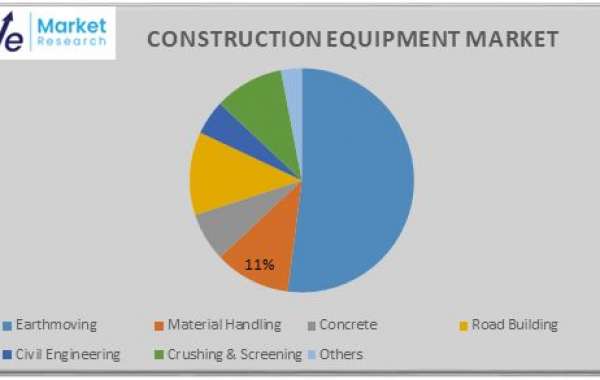Construction Equipment Market Introduction :
The term Construction Equipment describes large machines used for specialized building or demolition tasks. Earthmoving, lifting containers or commodities, drilling holes in the ground or rock, and concrete and paving applications are the main uses for this transportable, semi-permanent, or permanent equipment. Buildings for residential, commercial, and industrial use are among the other uses for it. Even if North America and Europe have significant need for construction equipment, Asia continues to be the primary market. Growing infrastructure development efforts worldwide are therefore expected to fuel demand for earthmoving and material handling equipment, which in turn will propel the expansion of the global construction equipment market.
https://wemarketresearch.com/reports/request-free-sample-pdf/construction-equipment-market/51
Construction Equipment Market Growth Dynamics
DRIVER: Growth in infrastructure development globally and rising demand for compact construction equipment
Technological developments, population growth, urbanization, the need to update current infrastructure, and a greater emphasis on creating environmentally friendly projects are the primary drivers of the industry's expansion. Also, as a result of more construction projects and planned new investments in the construction industry, the market for construction equipment has continuously expanded along with the sales of new equipment.
As per the UK Construction Leadership Council, the National Infrastructure Pipeline is set to receive about USD 645.7 billion in projected investments, encompassing 700 projects. The demand for construction equipment would be driven during the projection period by these anticipated investments and expanding construction activity for infrastructure development.
Important market segments for construction equipment include:
Earthmoving Equipment: For excavation and site preparation, backhoe loaders, bulldozers, and scrapers are needed.
Material handling equipment: On building sites, the moving of goods is made easier by cranes, forklifts, and loaders.
Equipment for Road Construction: To build roads and highways, one needs to employ graders, rollers, and pavers.
Construction equipment: Generators, pumps, and concrete mixers offer crucial assistance for building projects.
Upcoming Trends
Automation and robots: It is anticipated that the use of robotic and autonomous construction equipment will lower labor costs and boost productivity.
Hybrid and Electric Equipment: Concerns about the environment and improvements in battery technology are driving the transition to hybrid and electric power sources.
Equipped with Internet of Things capabilities, telematics and predictive maintenance are made possible by connected equipment.
RESTRAINT: Regulations and International trade policies
Each country has different laws and regulations governing the manufacture, import, and export of construction equipment. Different import tariffs are imposed by different countries to stop unfair trade practices and support native producers. Countries typically enter into bilateral trade agreements with other countries in order to reduce trade barriers and tariffs that impede the development of a single market or free trade area. This can lead to more global competition, even though it is beneficial. Foreign policy has a greater effect on trade. Trade agreements may be terminated or, in the worst case, restrictions may be implemented, so altogether prohibiting commerce, if disputes arise with other countries. As a result, impediments to the expansion and sale of the building sector are imposed by the consequences of global trade rules and regulations.
Key Attentions of Construction Equipment Market Report:
The report offers a comprehensive and broad perspective on the global Construction Equipment Market
The market statistics represented in different Construction Equipment Market segments offers complete industry picture.
Market growth drivers, challenges affecting the development of Construction Equipment Market are analyzed in detail.
The report will help in the analysis of major competitive market scenario, market dynamics of Construction Equipment.
Major stakeholders, key companies Construction Equipment investment feasibility and new market entrants study is offered.
Development scope of Construction Equipment Market in each market segment is covered in this report. The macro and micro-economic factors affecting the market
Advancement is elaborated in this report. The upstream and downstream components of Construction Equipment a comprehensive value chain are explained.
Construction Equipment Industry: Regional Analysis
Asia Pacific Market Forecast
With a market share of more than 46%, Asia Pacific leads the construction equipment industry and generates the most income. It is anticipated that over the projected period, the Asia Pacific region will exhibit the highest growth rate and greatest market share. This is the result of the rapid economic growth and urbanization of nations like China, India, and Southeast Asia. The significant infrastructure development expenditures made by these nations are increasing demand for construction equipment.
North America Market Statistics
North America Construction Equipment market is second largest market during the forecasted period. The market is expected to grow steadily due to the aging infrastructure in the region and the increasing focus on repair and replacement projects.
Frequently Asked Questions
- What is the market size of Construction Equipment Market in 2024?
- What is the growth rate for the Construction Equipment Market?
- Which are the top companies operating within the market?
- Which region dominates the Construction Equipment Market?
Conclusion:
The Construction Equipment Market is a dynamic and essential sector that plays a vital role in shaping the built environment. As technology continues to advance and infrastructure needs grow, the market is poised for further growth and innovation. By addressing the challenges and capitalizing on the opportunities, construction equipment manufacturers can position themselves for long-term success.




